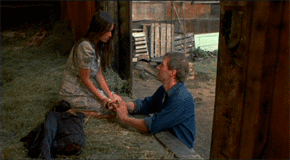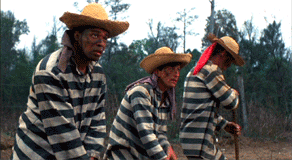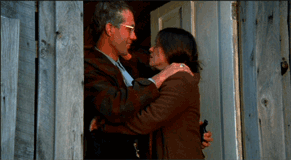Boxcar Bertha (Martin Scorsese) 1972
 Really, the only reason that anyone is going to watch Boxcar Bertha is
because it’s Martin Scorsese’s first studio feature. Certainly, Barbara
Hershey’s performance as the title character is passable, but it’s hardly
the best work that the often-brilliant actress has given. The movie is a fairly
obvious knockoff of Arthur Penn’s magnificent Bonnie and Clyde, and
even after acknowledging its many debts to that landmark film (the hyper violent
shootouts, the sexual frankness, and the kinetic editing), it doesn’t hold up
too well. Consider that around the same time, Scorsese’s contemporaries were
all making better road movies. When compared to Terrence Malick’s Badlands,
Robert Altman’s Thieves Like Us, and Steven Spielberg’s The
Sugarland Express, there’s no way that it can be thought of as better than
any of them. Of course, many of this movie’s problems lie in the cookie-cutter
script, which squanders most of the very real potential of a movie about Bertha
Thompson’s life, and settles for something that often looks embarrassingly
close to a feminist episode of TV’s The Dukes of Hazzard.
Really, the only reason that anyone is going to watch Boxcar Bertha is
because it’s Martin Scorsese’s first studio feature. Certainly, Barbara
Hershey’s performance as the title character is passable, but it’s hardly
the best work that the often-brilliant actress has given. The movie is a fairly
obvious knockoff of Arthur Penn’s magnificent Bonnie and Clyde, and
even after acknowledging its many debts to that landmark film (the hyper violent
shootouts, the sexual frankness, and the kinetic editing), it doesn’t hold up
too well. Consider that around the same time, Scorsese’s contemporaries were
all making better road movies. When compared to Terrence Malick’s Badlands,
Robert Altman’s Thieves Like Us, and Steven Spielberg’s The
Sugarland Express, there’s no way that it can be thought of as better than
any of them. Of course, many of this movie’s problems lie in the cookie-cutter
script, which squanders most of the very real potential of a movie about Bertha
Thompson’s life, and settles for something that often looks embarrassingly
close to a feminist episode of TV’s The Dukes of Hazzard.

Set during the
Great Depression, Boxcar Bertha follows Bertha as she and her small gang
of male acquaintances turn to a life of crime, supposedly with the intention of
overthrowing the tyrannous railroad empire. Hershey looks appropriately young in
the titular part, and she manages to be somewhat likable and awkward, even as
she’s sticking a gun in someone’s face. Her coy sassiness never grates, but
the film’s insistence that she should hold her head high for her actions often
does. The moustache-twirling villains that oppose her are caricatures, crafted
only so they can shock us into hating them. When a dastardly sheriff calls a
black inmate a “nigger”, we’re expected to seethe, and somehow ignore the
fact that in the South during the 1930’s even the good guys would likely use
that word. The movie’s scattershot feminist dogma gets fouled up whenever it
starts to adapt a stand-by-your-man conservatism (a problem that would later
come back to haunt Scorsese in his otherwise excellent Alice Doesn’t Live
Here Anymore).
 Much of Scorsese’s eventual directorial style is on display
here, but the director has little of the control that he demonstrated over it in
later films. Many shots are flashy for no apparent reason, lending the
impression that this movie served as a student film of sorts for the director.
His trademark religious symbolism is as obvious here as a brick to the face, but
his usual intelligence is nowhere to be found, outside of a duo of supporting
characters that are named Powell and Pressburger. If nothing else, we can be
glad that Scorsese made Boxcar Bertha in 1972, since after seeing it John
Cassavetes chastised him, reprimanding him for not making films that were more
personal. In 1973, he released Mean Streets, which changed everything.
Much of Scorsese’s eventual directorial style is on display
here, but the director has little of the control that he demonstrated over it in
later films. Many shots are flashy for no apparent reason, lending the
impression that this movie served as a student film of sorts for the director.
His trademark religious symbolism is as obvious here as a brick to the face, but
his usual intelligence is nowhere to be found, outside of a duo of supporting
characters that are named Powell and Pressburger. If nothing else, we can be
glad that Scorsese made Boxcar Bertha in 1972, since after seeing it John
Cassavetes chastised him, reprimanding him for not making films that were more
personal. In 1973, he released Mean Streets, which changed everything.
* *
05-01-02
Jeremy Heilman